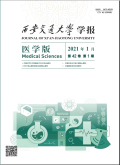西安交通大学学报(医学版)2024,Vol.45Issue(4):552-559,8.DOI:10.7652/jdyxb202404005
乳腺癌表型影响新辅助化疗后MRI反应评估的准确性
Breast cancer phenotype affects accuracy of MRI response evaluation after neoadjuvant chemotherapy
摘要
Abstract
Objective To evaluate which factors may affect magnetic resonance imaging(MRI)performance in the detection of pathologic complete response(pCR)after neoadjuvant chemotherapy(NAC).Methods This retrospective study involved 89 patients diagnosed with invasive breast carcinoma who received NAC at The Second Affiliated Hospital of Xi'an Jiaotong University from July 2019 to December 2021.Breast MRI was performed before and after NAC.Based on the pathological results obtained surgery after the completion NAC and using Miller-Payne classification as the evaluation standard,the patients were divided into two subgroups:pCR and non-pathological complete response(npCR).Chi-square test was used to compare the MRI characteristics of pre-NAC lesions between the two groups.ROC curve analysis was made to analyze the accuracy,sensitivity,specificity,positive predictive value,and negative predictive value of MRI after NAC;the diagnostic performance of MRI in predicting pCR in different tumor subtypes was analyzed.We made univariate and multivariate analyses of factors affecting radiographic complete response(rCR)and pCR concordance.Results MRI analysis after NAC showed rCR in 20 cases(22.5%)and pCR in 28 cases(31.5%).Considering rCR as a"positive"result of MRI analysis,MRI assessment was accurate in 79 cases,including 19 true positive cases and 60 true negative cases.MRI assessment was inaccurate in 10 cases,including 9 false negative cases and 1 false positive case.The sensitivity,specificity,accuracy,positive predictive value,and negative predictive value of MRI assessment of pCR were 67.86%,98.36%,88.76%,95.00%,and 86.96%.MRI had the lowest diagnostic efficiency in evaluating pCR of ERBB2+breast cancer after NAC.Single factor analysis showed that estrogen receptor(ER),clinical stage,background parenchymal enhancement,and maximum tumor diameter all affected the consistency of rCR and pCR(P<0.05).Multivariate Logistic regression analysis showed that the independent influencing factor affecting the consistency of rCR and pCR was clinical stage.Conclusion MRI demonstrated good accuracy in predicting pCR after NAC in the breast cancer patients examined.Pre-treatment MRI characteristics and tumor subtypes may be related to the diagnostic accuracy of post-NAC MRI in breast cancer patients.关键词
乳腺癌/新辅助化疗(NAC)/磁共振成像(MRI)/病理完全缓解(pCR)Key words
breast cancer/neoadjuvant chemotherapy(NAC)/magnetic resonance imaging(MRI)/pathological complete response(pCR)分类
医药卫生引用本文复制引用
郭转转,张冰,张莉,雷喆,梁文斌,杨全新,陈欣..乳腺癌表型影响新辅助化疗后MRI反应评估的准确性[J].西安交通大学学报(医学版),2024,45(4):552-559,8.基金项目
陕西省重点研发计划资助项目(No.2020SF-042)Supported by the Shaanxi Key Research&Development Plan(No.2020SF-042) (No.2020SF-042)

